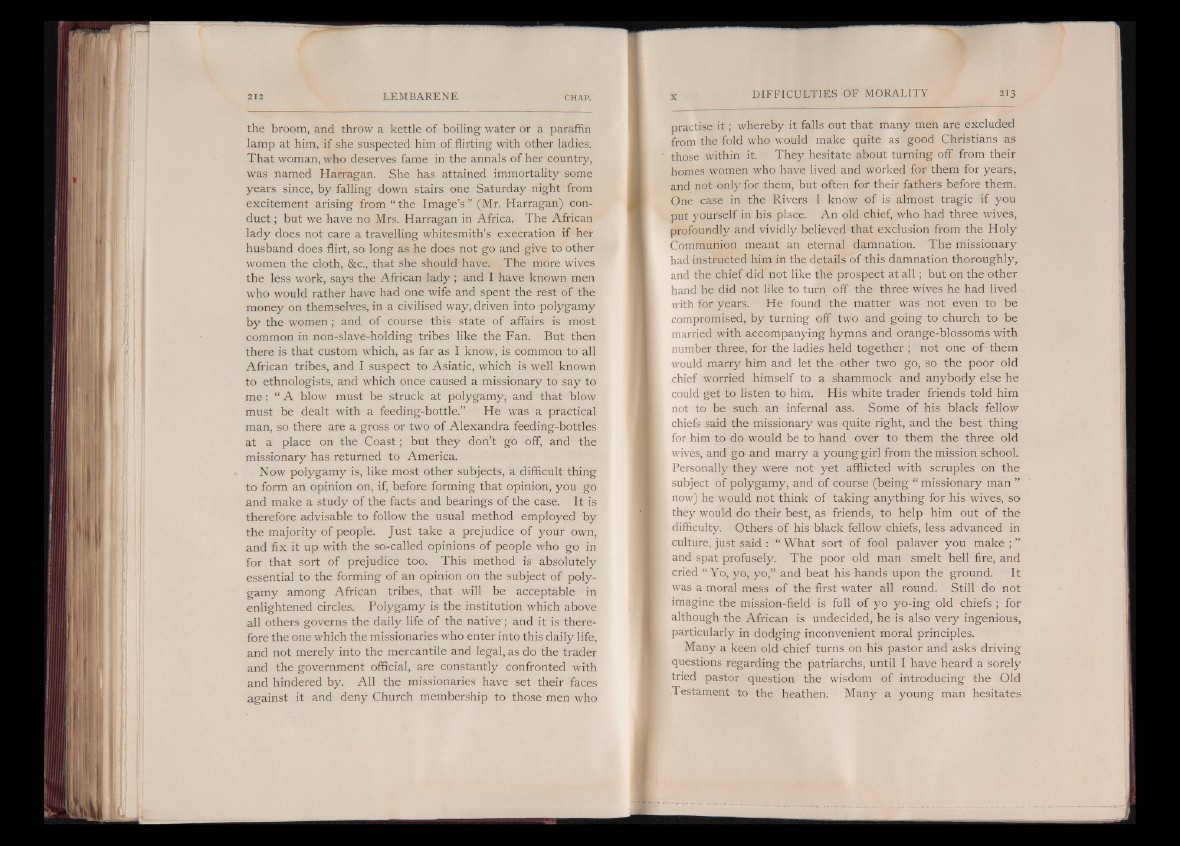
the broom, and throw a kettle of boiling water or a paraffin
lamp at him, if she suspected him of flirting with other ladies.
That woman, who deserves fame in the annals of her country,
was named Harragan. She has attained immortality some
years since, by falling down stairs one Saturday night from
excitement arising from “ the Image’s ” (Mr. Harragan) conduct
; but we have no Mrs. Harragan in Africa. The African
lady does not care a travelling whitesmith’s execration if her
husband does flirt, so long as he does not go and give to other
women the cloth, &c., that she should have. The more wives
the less work, says the African lad y ; and I have known men
who would rather have had one wife and spent the rest of the
money on themselves, in a civilised way, driven into polygamy
by the women; and of course this state of affairs is most
common in non-slave-holding tribes like the Fan. But then
there is that custom which, as far as I know, is common to all
African tribes, and I suspect to Asiatic, which is well known
to ethnologists, and which once caused a missionary to say to
m e : “ A blow must be struck at polygamy, and that blow
must be dealt with a feeding-bottle.” He was a practical
man, so there are a gross or two of Alexandra feeding-bottles
at a place on the Coast; but they don’t go off, and the
missionary has returned to America.
Now polygamy is, like most other subjects, a difficult thing
to form an opinion on, if, before forming that opinion, you go
and make a study of the facts and bearings of the case. It is
therefore advisable to follow the usual method employed by
the majority of people. Just take a prejudice of your own,
and fix it up with the so-called opinions of people who go in
for that sort of prejudice too. This method is absolutely
essential to the forming of an opinion on the subject of polygamy
among African tribes, that will be acceptable in
enlightened circles. Polygamy is the institution which above
all others governs the daily life of the native; and it is therefore
the one which the missionaries who enter into this daily life,
and not merely into the mercantile and legal, as do the trader
and the government official, are constantly confronted with
and hindered by. All the missionaries have set their faces
against it and deny Church membership to those men who
practise i t ; whereby it falls out that many men are excluded
from the fold who would make quite as good Christians as
those within it. They hesitate about turning off from their
homes women who have lived and worked for them for years,
and not only for them, but often for their fathers before them.
One case in the Rivers I know of is almost tragic if you
put yourself in his place. An old chief, who had three wives,
profoundly and vividly believed that exclusion from the Holy
Communion meant an eternal damnation. The missionary
had instructed him in the details of this damnation thoroughly,
and the chief did not like the prospect at a l l ; but on the other
hand he did not like to turn off the three wives he had lived
with for years. He found the matter was not even to be
compromised, by turning off two and going to church to be
married with accompanying hymns and orange-blossoms with
number three, for the ladies held together ; not one of them
would marry him and let the other two go, so the poor old
chief worried himself to a shammock and anybody else he
could get to listen to him. His white trader friends told him
not to be such an infernal ass. Some of his black fellow
chiefs said the missionary was quite right, and the best thing
for him to do would be to hand over to them the three old
wives, and go and marry a young girl from the mission school.
Personally they were not yet afflicted with scruples on the
subject of polygamy, and of course (being “ missionary man ”
now) he would not think of taking anything for his wives, so
they would do their best, as friends, to help him out of the
difficulty. Others of his black fellow chiefs, less advanced in
culture, just said : “ What sort of fool palaver you make ; ”
and spat profusely. The poor old man smelt hell fire, and
cried “ Yo, yo, yo,” and beat his hands upon the ground. It
was a moral mess of the first water all round. Still do not
imagine the mission-field is full of yo yo-ing old chiefs ; for
although the African is undecided, he is also very ingenious,
particularly in dodging inconvenient moral principles.
Many a keen old chief turns on his pastor and asks driving
questions regarding the patriarchs, until I have heard a sorely
tried pastor question the wisdom of introducing the Old
Testament to the heathen. Many a young man hesitates